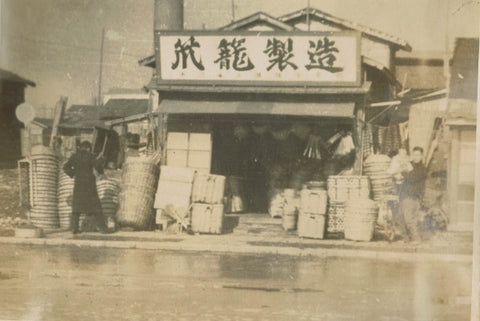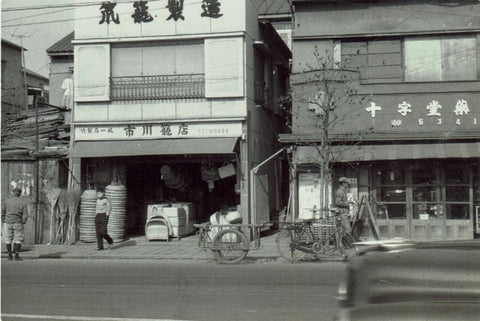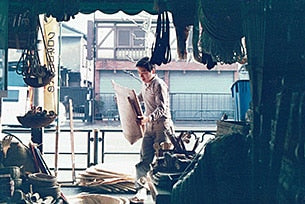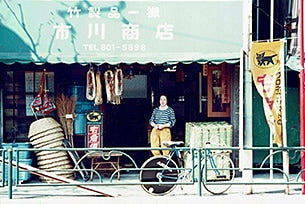Our History

Since the Edo Period
Ichikawa Basketry Store traces its origins to a tofu shop in Iriya-mura (present-day Iriya in Adachi, Tokyo). Alongside tofu making, the family gradually began offering handwoven baskets—a small trade that continued through successive generations.
The First-generation Owner
The first-generation owner crafted and sold bamboo baskets and bamboo colanders. He was particularly skilled in making fine bamboo colanders, some of which were used in restaurants in the Asakusa area.
Around 1890
Relocated to Senju 3-chome (present-day Kita-Senju in Adachi)
1896
Japan Freight Railway Company’s Sumidagawa Station began service
Around 1900
Moved to Asakusa Tanaka-machi (present-day Nihonzutsumi in Taito)
The Second-generation Owner
The second-generation owner began making bamboo baskets and bamboo colanders in his teenage years. After serving in the Russo-Japanese War, he also started selling household goods and other daily items. He devoted particular effort to improving the quality of rectangular baskets (kakukago), continually seeking ways to refine their construction. Young craftsmen from neighboring prefectures came to the store to learn their craft under him.
1904–1905
The Russo-Japanese War
1911
The store in Asakusa Tanaka-machi was destroyed in the Great Fire of Yoshiwara
Relocated nearby to Minami-Senju-machi in Toshima District (present-day Minami-Senju in Arakawa)
1923
The store was destroyed again in the Great Kanto Earthquake
The Third-generation Owner
After World War II, bamboo basket production resumed in Senju-Suehiro-cho (in present-day Adachi Ward), where the third-generation owner had evacuated. He also crafted baskets for teacups. In Japan at that time, bamboo baskets and wooden boxes were commonly used for shipping, but from the 1950s to the 1960s this gradually shifted to cardboard boxes. With the rise of plastic boxes during the same period, demand for bamboo baskets declined. As a result, around 1970 the store transitioned from mainly being a manufacturing wholesaler to operating primarily as a retailer.
1945
The store was destroyed by the air raids that set fire to the present-day Minami-Senju 2-chome area
World War II came to an end
1958
Construction of our current two-story building was completed
1975
The store name was changed to “Ichikawa Store,” reflecting a shift from specializing mainly in bamboo baskets to carrying a broader range of household goods, as it had become difficult to sustain the business with baskets alone.
|
1947 When our store was a one-story building |
1958 Construction of the current building |
The Fourth-generation Owner
At this time, the fourth-generation owner was wholesaling and retailing products, as well as stocking handwoven items from all over Japan. He would frequently visit craftspeople particularly in the eastern part of Saitama, the southern part of Tochigi, the western part of Ibaraki, and the northwestern part of Chiba to stock items the owner would request them to make. There was also a demand for Asian bamboo products from countries such as China which were sold at the store. (At this time, as domestic manufacturing of bamboo products decreased, a large amount of inexpensive bamboo products circulated simultaneously throughout Asia.)
He also manufactured bamboo skewers used in Shinto-related festivals, and bamboo taiko drumsticks used in Kagura (a type of Shinto ceremonial dance). In addition to these, he also carried out reinforcement work on commercially used bamboo colanders, strengthening them with wire. He also participated in events held by department stores and began operating a mail-order business.
1982
The fourth-generation owner took over the business
Around 2005
The online store was opened
|
1988 The fourth-generation owner inspecting winnows in front of the store |
1988 A view of the store from the outside |
The Current Owner
Due to the sudden passing of the previous owner, the current owner inherited the store despite coming from a different professional background. He began visiting producing regions and craftspeople throughout Japan, learning about the unique culture and customs of each area while deepening his connection with the people he met. One year after taking over the business, he participated in the World Wicker and Weaving Festival in Poland together with interpreters and fellow craftspeople. Through these experiences, he began carrying handwoven items from overseas as well and built relationships with craftspeople from other countries.
At the festival held in 2019, he delivered a presentation introducing the wide variety of traditional baskets crafted across Japan, sharing knowledge about Japanese handwoven culture with participants from around the world. Today, the store offers not only domestic works but also a broad selection of handwoven items sourced internationally.
2014
The store name was changed to “Ichikawa Store: Bamboo Basketry for Everyday Living”
2015
Opened an online store under the same name
Participated in the fourth World Wicker and Weaving Festival (held in Poland)
2019
Participated in the fifth World Wicker and Weaving Festival (held in Poland)
2020
Changed store name to “Ichikawa Basketry Store: Baskets, Colanders, Winnows for Everyday Living”
2021
Renewed the online store
*All information concerning the store’s early history (up to the third-generation owner) is based on the records left by the third-generation owner.*




